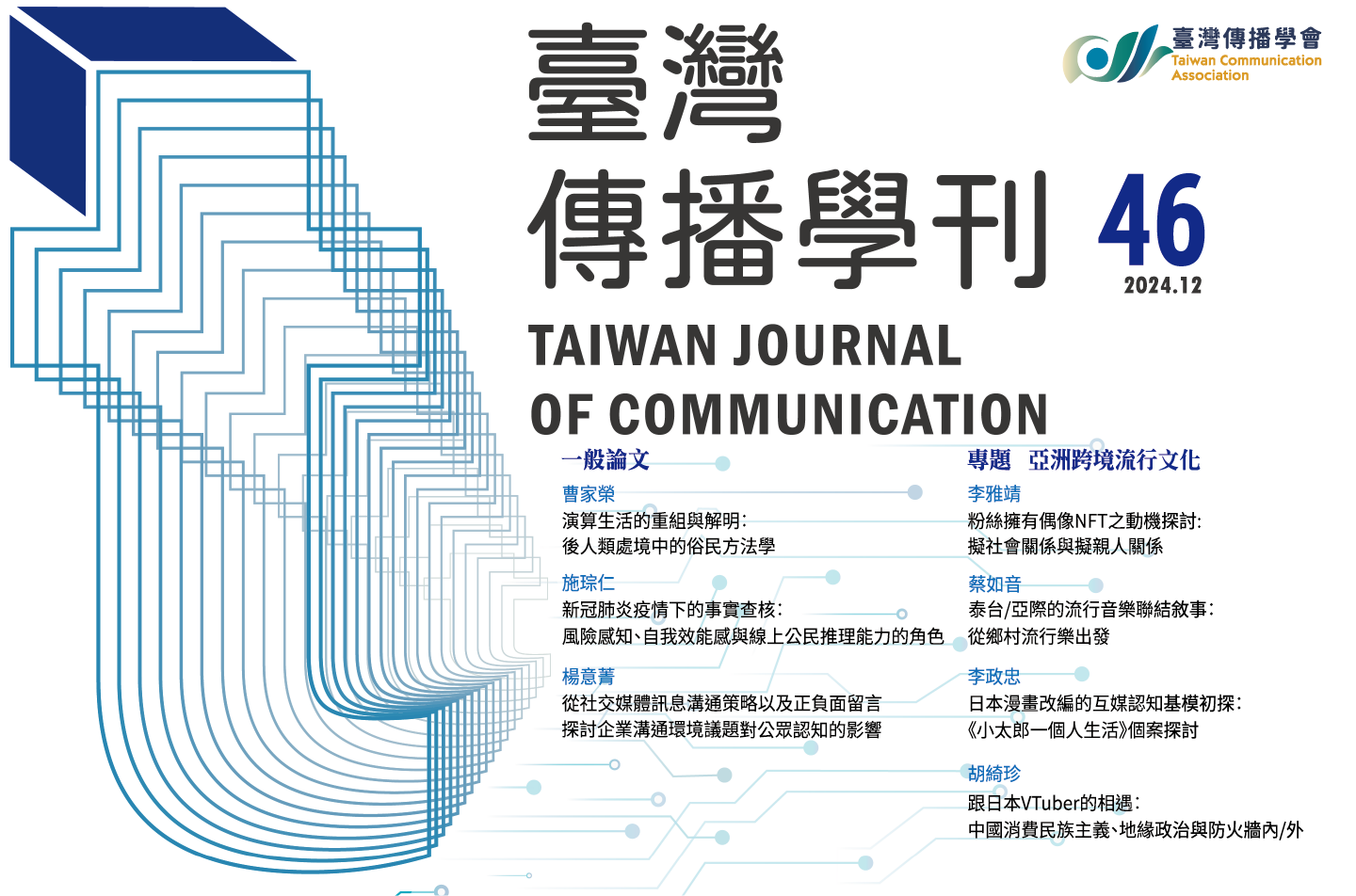 閱覽人數: 1858
閱覽人數: 1858
December
2024
No. 46
亞洲跨境流行文化
Cross-border popular culture in Asia頁數:37 - 79
作者(中)
施琮仁
作者(英)
Tsung-Jen Shih
關鍵詞(中)
不實訊息、自我效能感、社群媒體使用、風險感知、新冠肺 炎、公民線上推理能力
關鍵詞(英)
COVID-19, Misinformation, Civic Online Reasoning, Risk Perception, Self-efficacy, Social Media Use
中文摘要
結合O1-S-O2-R 模型及保護動機理論,本研究以新冠肺炎疫情為背
景,探討影響事實查核行為意圖的因素。運用網路調查資料(N =
1,248),本研究發現社群媒體和事實查核行為意圖同時具有直接關係
及間接關係。自我效能感是顯著的中介變項,但風險感知和事實查核
行為意圖無關,也非顯著之中介變項。此外,公民線上推理能力和社
群媒體使用、自我效能感皆具有交互作用關係,此結果對不實訊息相
關防制策略的擬定具有一定貢獻。
景,探討影響事實查核行為意圖的因素。運用網路調查資料(N =
1,248),本研究發現社群媒體和事實查核行為意圖同時具有直接關係
及間接關係。自我效能感是顯著的中介變項,但風險感知和事實查核
行為意圖無關,也非顯著之中介變項。此外,公民線上推理能力和社
群媒體使用、自我效能感皆具有交互作用關係,此結果對不實訊息相
關防制策略的擬定具有一定貢獻。
英文摘要
Drawing upon the O1-S-O2-R and the protection motivation models, this
study examines the factors shaping people’s fact-checking behavioral
intentions, focusing on the mediation role of self-efficacy and risk perception.
This study also investigates the moderating effect of civic online reasoning.
To date, research about the impact of social media use on fact-checking
behavioral intentions is scarce, especially in the context of the COVID-19
pandemic. Employing an online survey of Taiwanese adults, collected
between July 27 and August 3, 2021 (N = 1,248), this study conducted a
moderated mediation analysis. The results indicated that social media exerts
both a direct and an indirect positive effect on fact-checking behavioral
intentions. Self-efficacy, but not risk perception, serves as the mediator of
this relationship. Civic online reasoning moderated the effects of social
media use and self-efficacy on fact-checking behavioral intentions.
Implications of the findings will be discussed.
study examines the factors shaping people’s fact-checking behavioral
intentions, focusing on the mediation role of self-efficacy and risk perception.
This study also investigates the moderating effect of civic online reasoning.
To date, research about the impact of social media use on fact-checking
behavioral intentions is scarce, especially in the context of the COVID-19
pandemic. Employing an online survey of Taiwanese adults, collected
between July 27 and August 3, 2021 (N = 1,248), this study conducted a
moderated mediation analysis. The results indicated that social media exerts
both a direct and an indirect positive effect on fact-checking behavioral
intentions. Self-efficacy, but not risk perception, serves as the mediator of
this relationship. Civic online reasoning moderated the effects of social
media use and self-efficacy on fact-checking behavioral intentions.
Implications of the findings will be discussed.